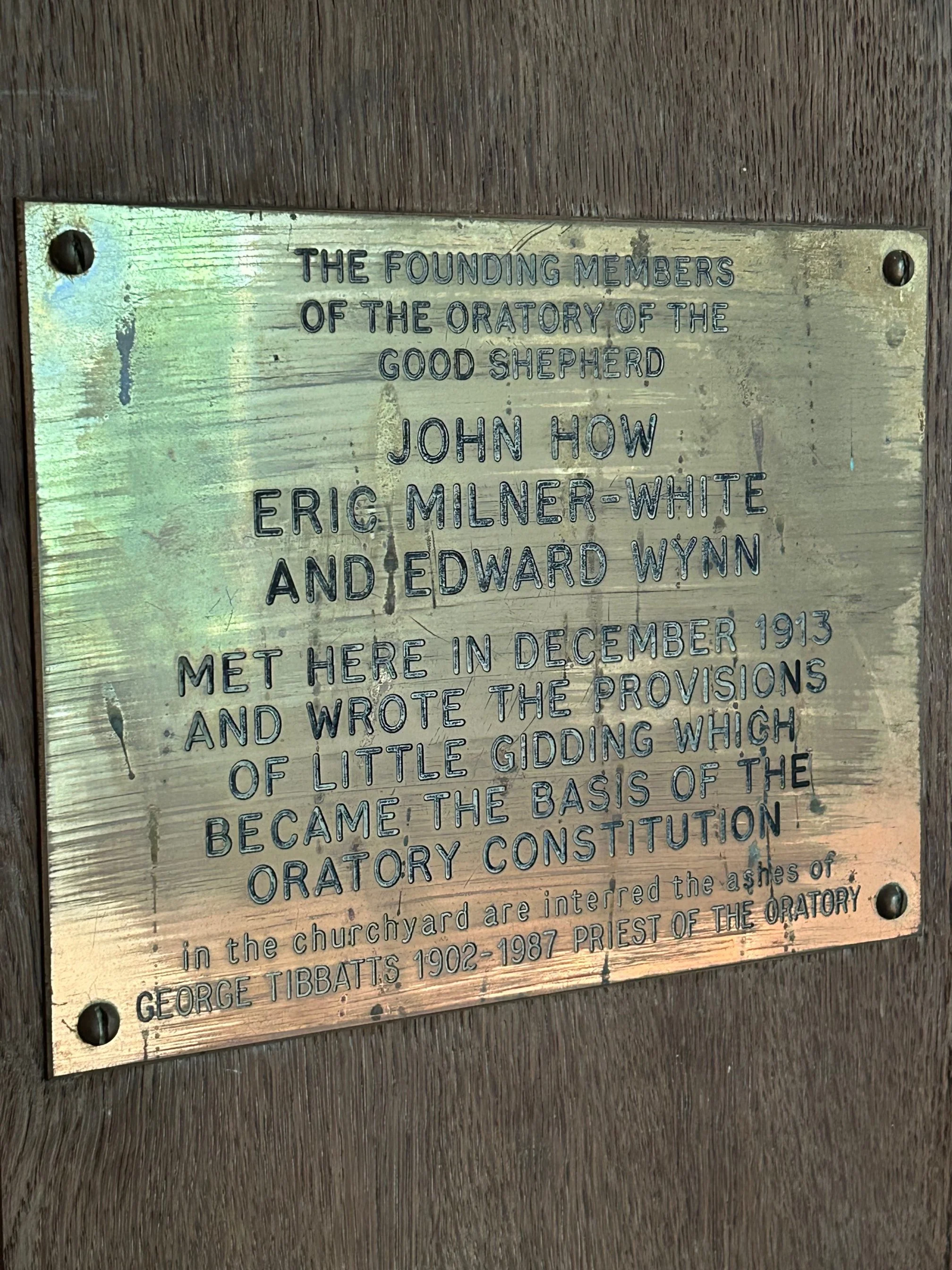
Most religious orders or societies have one founder, but the Oratory distinctively has three: John How (1881–1961), Eric Milner-White (1884–1963), and Edward Wynn (1889–1956). All three were educated at Cambridge University; were ordained in the Church of England and served as chaplains on the front during the First World War; and then returned to Cambridge in academic and pastoral roles. How was based primarily at St. John’s College, Milner-White at King’s, and Wynn at both Jesus and Pembroke.
After several years of discernment in regard to religious life in the Anglican tradition, in 1913 they spent a week on retreat at Little Gidding and drew up the Oratory’s founding documents, including the Seven Notes. Dedicated to and inspired by Jesus the Good Shepherd, the patron of the Oratory is the founder of the community at Little Gidding, Deacon Nicholas Ferrar (1592–1637). Initial intentions were made in 1913 in the Chapel of Sidney Sussex College, and the first professions were made in 1919 in the Church of St. Edward King and Martyr. The three founders initially remained in their separate colleges as chaplain-dons but met daily for mass and weekly for fellowship.
The precise nature of the Oratory in comparison with other religious orders has always been a matter of debate and speculation, partly because its members rarely live in a community of shared goods, and partly because professions—while intended for life—are initially renewed annually…or not, as the case may be. Of the three founders, only Edward Wynn—who was appointed Bishop of Ely from 1941 to 1956—remained in profession to the end of his life. John How left Cambridge for a series of pastoral appointments, was married, and eventually became the Bishop of Glasgow in 1938 and Primus of the Scottish Episcopal Church from 1946 to 1952. Eric Milner-White—most famous for creating the Service of Nine Lessons and Carols at King’s College Cambridge in 1927—became the Dean of York Minister from 1941 until his death. But all three left their lasting mark on the Oratory’s charism of service, pastoral care, study, prayer, liturgical worship, and sacramental devotion.
Other members joined the founders in due course and the brotherhood gradually grew into a worldwide society. Most Oratorians have been engaged primarily in parochial ministry but departed brethren include distinguished scholars such as Wilfred Knox (1886–1950), Alec Vidler (1899–1991), Eric Mascall (1905–1993), and Victor Preller (1931–2001), as well as a number of missionaries, bishops, and other senior church leaders. The current Visitor is Rowan Williams.
While rooted in a basic Anglo-Catholic understanding of the Christian faith, the Oratory has contained within its fellowship a wide diversity of theological, moral, and political perspectives, ranging from “conservative” to “liberal.” As the Fifth Note says: “Brethren must try to understand these differing opinions, in the hope that they may help to restore the unity of all Christian people in the spirit of charity and peace. They will recognise in all people those for whom Christ died, and will treat them with the courtesy and reverence due to his great love.”
Bring us, O Lord God, at our last awakening,
into the house and gate of heaven, to enter into that gate, and dwell in that house,
where there shall be no darkness nor dazzling, but one equal light;
no noise nor silence, but one equal music;
no fears nor hopes, but one equal possession;
no ends nor beginnings, but one equal eternity;
in the habitation of your glory and dominion,
world without end. Amen.
(A prayer of Eric Milner-White, adapted from a sermon by John Donne)
Edward Wynn, one of the three founders
Historical plate at Little Gidding
The Chapel of Sidney Sussex College, Cambridge


